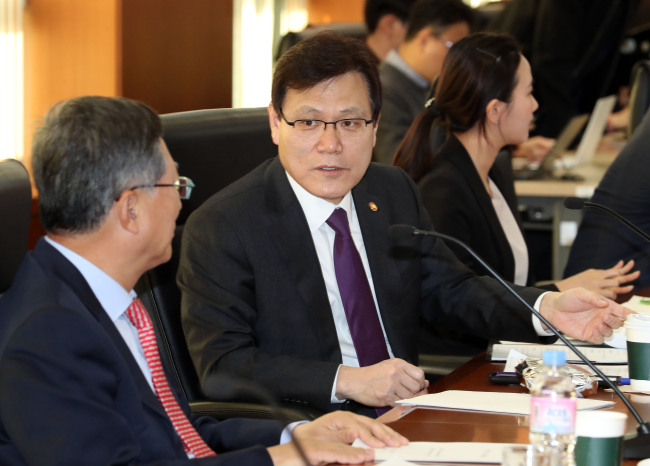South Korea’s financial regulator will require all listed companies here to disclose their governance structure to the investing public, as part of efforts to improve management transparency, its head said Thursday.
Choi Jong-ku, chairman of the Financial Services Commission, also said that his organization plans to provide incentives to institutional investors who adopt a Korean-version of Stewardship Code, a set of principle aimed at improving their voting rights.

Choi Jong-ku, chairman of the Financial Services Commission (Yonhap)
“For now, companies freely (choose to) disclose corporate governance to the stock exchange, (but) we will phase in the new system to make it mandatory,” said Choi, at a meeting held with global institutional invetors in Seoul at the Korea Exchange.
The plan is to give institutional investors a clear access to corporate governance, the FSC said. It will release detailed plans within next month, after consulting the matter with the Korea Exchange and the Korea Listed Company Association.
Starting this year, the Korea Exchange has encouraged the listed companies to disclose their governance structure, but the percentage of companies that joined the efforts still remains low. By Nov. 1, of the 748 companies listed in the securities market here only 31 companies, or 4 percent, had made public reports on their corporate structure.
As to the Stewardship Code, the chairman said the National Pension Fund, the largest institutional investor in South Korea, is running a study on the subject.
“If the pension fund plays a leading role, other institutional investors will actively follow,” he said. To improve the voting rights by public funds like the NPF, the FSC is also considering lowering their burden of disclosing how many shares they hold in the companies, he added.
Institutional investors fear being seen as intervening in management of the companies of which they hold more than 5 percent of shares. ###
Regulators have been facing growing calls to adopt the guidelines that urge fund managers and institutional investors to disclose their reasons for exercising voting rights at shareholder meetings, and explain to shareholders if their actions do not comply with any of the principles in the code.
Critics have said that institutional investors have been passive in voicing their opposition or remained unclear on their decisions at shareholder meetings, citing allegations that the state-run National Pension Service had approved the landmark deal between Samsung C&T and Cheil Industries under political pressure from Cheong Wa Dae in 2015.
By Cho Chung-un (christory@heraldcorp.com)

![[AtoZ into Korean mind] Humor in Korea: Navigating the line between what's funny and not](http://res.heraldm.com/phpwas/restmb_idxmake.php?idx=645&simg=/content/image/2024/04/22/20240422050642_0.jpg&u=)

![[Exclusive] Korean military set to ban iPhones over 'security' concerns](http://res.heraldm.com/phpwas/restmb_idxmake.php?idx=645&simg=/content/image/2024/04/23/20240423050599_0.jpg&u=20240423183955)

![[Herald Interview] Why Toss invited hackers to penetrate its system](http://res.heraldm.com/phpwas/restmb_idxmake.php?idx=645&simg=/content/image/2024/04/22/20240422050569_0.jpg&u=20240422150649)
![[Graphic News] 77% of young Koreans still financially dependent](http://res.heraldm.com/phpwas/restmb_idxmake.php?idx=645&simg=/content/image/2024/04/22/20240422050762_0.gif&u=)